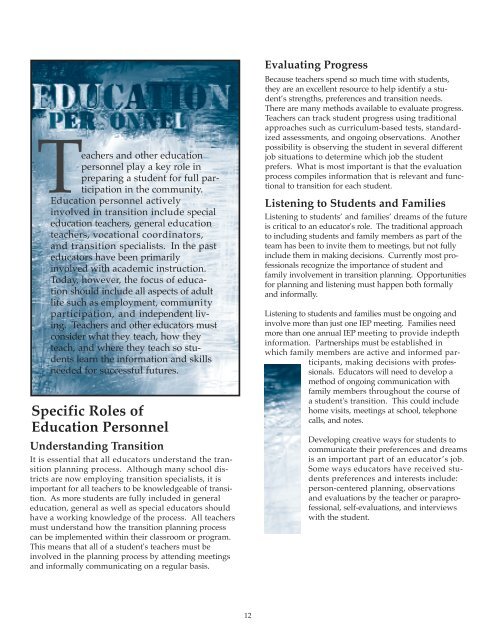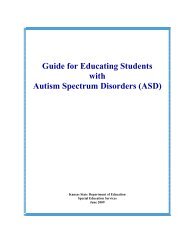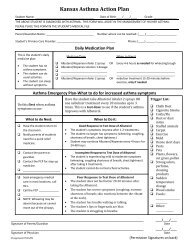People make it happen(PDF)1 - Families Together Inc.
People make it happen(PDF)1 - Families Together Inc.
People make it happen(PDF)1 - Families Together Inc.
Create successful ePaper yourself
Turn your PDF publications into a flip-book with our unique Google optimized e-Paper software.
Teachers and other education<br />
personnel play a key role in<br />
preparing a student for full participation<br />
in the commun<strong>it</strong>y.<br />
Education personnel actively<br />
involved in trans<strong>it</strong>ion include special<br />
education teachers, general education<br />
teachers, vocational coordinators,<br />
and trans<strong>it</strong>ion specialists. In the past<br />
educators have been primarily<br />
involved w<strong>it</strong>h academic instruction.<br />
Today, however, the focus of education<br />
should include all aspects of adult<br />
life such as employment, commun<strong>it</strong>y<br />
participation, and independent living.<br />
Teachers and other educators must<br />
consider what they teach, how they<br />
teach, and where they teach so students<br />
learn the information and skills<br />
needed for successful futures.<br />
Specific Roles of<br />
Education Personnel<br />
Understanding Trans<strong>it</strong>ion<br />
It is essential that all educators understand the trans<strong>it</strong>ion<br />
planning process. Although many school districts<br />
are now employing trans<strong>it</strong>ion specialists, <strong>it</strong> is<br />
important for all teachers to be knowledgeable of trans<strong>it</strong>ion.<br />
As more students are fully included in general<br />
education, general as well as special educators should<br />
have a working knowledge of the process. All teachers<br />
must understand how the trans<strong>it</strong>ion planning process<br />
can be implemented w<strong>it</strong>hin their classroom or program.<br />
This means that all of a student's teachers must be<br />
involved in the planning process by attending meetings<br />
and informally communicating on a regular basis.<br />
Evaluating Progress<br />
Because teachers spend so much time w<strong>it</strong>h students,<br />
they are an excellent resource to help identify a student’s<br />
strengths, preferences and trans<strong>it</strong>ion needs.<br />
There are many methods available to evaluate progress.<br />
Teachers can track student progress using trad<strong>it</strong>ional<br />
approaches such as curriculum-based tests, standardized<br />
assessments, and ongoing observations. Another<br />
possibil<strong>it</strong>y is observing the student in several different<br />
job s<strong>it</strong>uations to determine which job the student<br />
prefers. What is most important is that the evaluation<br />
process compiles information that is relevant and functional<br />
to trans<strong>it</strong>ion for each student.<br />
Listening to Students and <strong>Families</strong><br />
Listening to students’ and families’ dreams of the future<br />
is cr<strong>it</strong>ical to an educator's role. The trad<strong>it</strong>ional approach<br />
to including students and family members as part of the<br />
team has been to inv<strong>it</strong>e them to meetings, but not fully<br />
include them in making decisions. Currently most professionals<br />
recognize the importance of student and<br />
family involvement in trans<strong>it</strong>ion planning. Opportun<strong>it</strong>ies<br />
for planning and listening must <strong>happen</strong> both formally<br />
and informally.<br />
Listening to students and families must be ongoing and<br />
involve more than just one IEP meeting. <strong>Families</strong> need<br />
more than one annual IEP meeting to provide indepth<br />
information. Partnerships must be established in<br />
which family members are active and informed participants,<br />
making decisions w<strong>it</strong>h professionals.<br />
Educators will need to develop a<br />
method of ongoing communication w<strong>it</strong>h<br />
family members throughout the course of<br />
a student's trans<strong>it</strong>ion. This could include<br />
home vis<strong>it</strong>s, meetings at school, telephone<br />
calls, and notes.<br />
Developing creative ways for students to<br />
communicate their preferences and dreams<br />
is an important part of an educator’s job.<br />
Some ways educators have received students<br />
preferences and interests include:<br />
person-centered planning, observations<br />
and evaluations by the teacher or paraprofessional,<br />
self-evaluations, and interviews<br />
w<strong>it</strong>h the student.<br />
12





